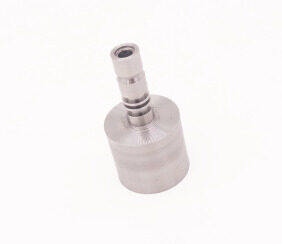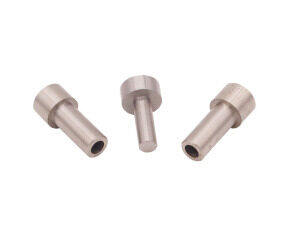Kunshan Guozheng Precision Mold Co.,Ltd
Add: No.396, Dujia Road, Zhoushi Town, Kunshan City
Email: info@kokusei-seimitsu.com.cn
Tel:+86 0512-57171088
Phone: +86 0512-57171088
Email:info@kokusei-seimitsu.com.cn
Website: www.kokusei.com.cn
Address:No.396, Dujia Road, Zhoushi Town, Kunshan City
When it comes to CNC machining parts, there are several key factors that manufacturers and engineers should pay close attention to. These factors can determine the quality, functionality, and efficiency of the machined parts. In this article, we will discuss some of the crucial factors that need to be considered in CNC machining.
Material Selection: Choosing the right material for CNC machining parts is of utmost importance. The material should be suitable for the desired application, have good machinability, and provide the required strength and durability. Common materials used in CNC machining include metals (aluminum, steel, titanium), plastics (ABS, acrylics, nylon), and composites.
Design for Manufacturing (DFM): Designing parts specifically for CNC machining can significantly impact the manufacturing process and final product quality. DFM focuses on improving manufacturability by considering factors like material selection, part orientation, tool access, and minimizing complex features. By optimizing the design, it is possible to enhance machining efficiency, reduce costs, and improve the quality of the finished part.
Tolerances and Surface Finish: Tolerances define the allowable deviation from the design dimensions. It is essential to define tolerances based on the part's function and the manufacturing capabilities of the CNC machine. Surface finish, on the other hand, describes the texture and quality of the machined surfaces. Factors such as tool selection, cutting speed, and feed rate can influence surface finish. It is crucial to specify the required tolerances and surface finish to ensure that the CNC machining parts meet the desired specifications.

Tool Selection: Choosing the right tools is critical for achieving accurate and efficient CNC machining. The selection of cutting tools depends on factors such as material hardness, cutting speed, feed rate, and surface finish requirements. Different materials may require specific tooling options, such as carbide or high-speed steel. Proper tool selection can significantly impact the machining process, including chip formation, cutting forces, and tool life.
Machining Parameters: Optimizing machining parameters is vital to achieving efficient and accurate CNC machining parts. Parameters such as cutting speed, feed rate, depth of cut, and coolant usage should be carefully adjusted to maximize productivity and quality. Cutting speed refers to the speed at which the cutting tool moves, feed rate refers to the rate at which the cutting tool advances along the material, and depth of cut refers to the distance between the tool and the material surface. Properly adjusting these parameters can help reduce tool wear, improve surface finish, and minimize machining time.
Fixturing and Workholding: Securing the workpiece properly during CNC machining is crucial to maintain accuracy and prevent any movement or vibration that may affect the final part's quality. Choosing the right workholding devices and fixtures is essential to ensure proper alignment, stability, and accessibility during machining.

Quality Control and Inspection: Inspecting CNC machining parts throughout the manufacturing process is essential to ensure that they meet the required specifications. Quality control measures typically involve dimensional checks, surface inspections, and material testing. The use of advanced metrology equipment, such as coordinate measuring machines (CMMs), can help verify part dimensions and characteristics accurately.
Post-Machining Processes: After CNC machining, some parts may require additional processes to achieve the desired characteristics. These processes may include deburring, polishing, heat treatment, anodizing, plating, or painting. It is important to plan and consider these post-machining processes during the initial design stage to ensure that the part's final requirements are met.
In conclusion, CNC machining parts require careful consideration of several key factors. Material selection, DFM principles, tolerances, surface finish, tool selection, machining parameters, fixturing, quality control, and post-machining processes all play significant roles in the successful production of high-quality CNC machined parts. By focusing on these factors, manufacturers can optimize the machining process and deliver parts that meet the desired specifications and functional requirements.